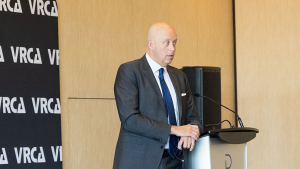AI may be transforming construction, but it must fit into the industry’s needs, says one expert.
Timescapes enterprise account executive Victoria Beaton held a toolbox session at the recent Vancouver Regional Construction Association (VRCA) Construction Leadership Forum in Whistler, B.C. titled Form Follows Function with AI in Construction.
She explained the title of her session reflects the need to bring technology and construction back to the classical architecture idea of “form follows function” as first postulated by 19th century architect Louis Sullivan.
“When you think of the functionality of a building, such as a hospital treating sick people, it should be designed with that purpose in mind,” Beaton said. “There are parallels to that (practice) with artificial intelligence (AI) and construction now, where it’s important to design and select AI tools with purpose and functionality up front.”
She added AI tools must be able to integrate with existing systems and workflows in construction firms in order to provide functionality, while future-proofing companies by gathering vast amounts of data for later analysis.
“An idea we’re starting to implement is to use technology that adds value to project teams today while simultaneously starting to capture massive amounts of data to power advancement in tomorrow’s world,” she said.
She cited SpecGPT, an AI platform that converts construction specifications into data users can interact with as an example of where the industry is headed.
“It’s a tool that allows you to upload pages and pages of contract documents. You can type in a question like, ‘Can I pour concrete in 30-degree weather?’ And it will pull up parts of documents that have the answer, which saves time on the worksite,” Beaton said.
Timescapes, she said, uses new camera technology to not only capture timelapses but also analyze images in real time, opening up possibilities for productivity and safety improvements.
“You can analyze all the images. We’ve fed the software hundreds of millions of images of assets like hardhats, concrete trucks and so forth so you can, in real time, analyze images and pick out OHS violations, such as not wearing a hard hat,” she said.
“Eventually the technology will be predictive in nature so you can see certain activity levels within a defined space and can also see where you can assess safety risk by percentage (on a site),” she added.
Beaton estimated in the next five years it will be possible to feed AI all the data an organization has ever collected and use it to inform decisions both on the ground and in the boardroom.
“All your estimating, scheduling contracts and everything pulled visually from the site could be fed into a customized AI model tailored for your own business. The Ai could then customize that for different roles within the organization, so different employees can query and get real time response that conform to the company brands and guidelines,” she said.
Construction leaders at large general contractors are already putting a data strategy in place form the top down to create a “culture of data,” she said, citing former EllisDon CEO Geoff Smith, who now heads up the company’s digital strategy and execution.
“He’s always talking about data. I think what he’s referring to is AI’s pivotal role in construction where you’re capturing massive amounts of data from a company and using AI to provide insights in order to drive better decision-making at every step of the construction process,” Beaton said.
While the push to adopt AI is prominent in large general contracting firms, she said, smaller firms are also taking initial steps with the technology.
“We’re not seeing it as much with smaller companies, mainly with large GCs, but even smaller companies have someone in a technology analyst role,” she said.








Recent Comments
comments for this post are closed